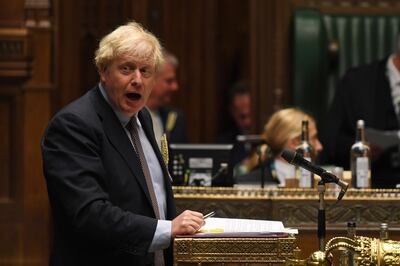British Prime Minister Boris Johnson on Wednesday made plans to give greater powers to police and authorities as he announced England’s strictest lockdown measures since social distancing eased in May.
From Monday, England will tighten its lockdown rules after British daily coronavirus cases surged from roughly 1,000 to 3,000 in the past few days.
Who is spreading the virus in the UK and where is it spreading?
UK cases have risen sharply in recent weeks, especially among 17-21 year-olds, where infections have been soaring since mid-August.
Chris Whitty, the UK's chief medical officer, said at a Downing Street press conference on Wednesday that the rise in cases was "not just in a very small number of places", but across the whole country.
Since lockdown measures eased in May, British towns and cities with high rates of infections – such as Bolton in Greater Manchester, in the north of England, Caerphilly in Wales and Dundee in Scotland – have gone back into local lockdowns, under constant review, to help stave off the virus.
Why has the government brought in the new rules?
The Johnson government has been criticised since the beginning of the pandemic for the ambiguity around its Covid-19 messaging. It has often changed the rules, first adopting the controversial “herd immunity strategy” before making an about-turn and encouraging people to socially distance and self-isolate.

Health Secretary Matt Hancock even conceded that the police wanted the coronavirus rules to be simplified so the public would fully understand them.
“One of the pieces of feedback we had, including from the police, was that we needed the rules to be super-simple so that everybody knows what they are,” Mr Hancock told the BBC.
“And now this will be rigorously enforced by the police.”
It is hoped that the new policy will set the record straight with the public and remove any confusion around the rules. But it will mean that millions of people will now have to call off their social plans.
The government is endeavouring to avoid a full second lockdown, but on Tuesday David King, the former government chief scientific adviser, warned Prime Minister Boris Johnson one may have to be imposed this month unless the track-and-trace system is improved.
Mr Hancock did not offer a timetable as to how long the new rules would be enforced, saying only that they would be applied “for the foreseeable future”.
Mr Johnson revealed more details about the latest policy at Wednesday afternoon, alongside his senior scientific advisers.
How will the new rules work?
Social gatherings of more than six people in England will be illegal from September 14, though there will be some exceptions.
The rules will not apply to schools, workplaces or weddings, funerals or team sports that are abiding by the government’s Covid-19 guidelines.
They will, however, apply to gatherings in venues such as pubs and restaurants.
If people break the rules, they face a £100 (Dh473) fine, which doubles on each repeated offence up to a maximum of £3,200.
According to England’s current rules, two households of any size are allowed to meet indoors and outdoors, or up to six people outdoors from different households.
However, under the new rules, the legal limit at which police can disperse gatherings will be revised down from 30 to six people.
Is this a second lockdown?
Despite infections soaring in the UK, death rates have remained low in recent weeks. Britain recorded more than 2,500 new cases on Wednesday but only eight deaths.
But death rates lagged behind new cases in March and could do so again, and this is being seen in other European countries such France and Spain.
France, now the epicentre of the pandemic in Europe, saw 6,544 new cases on Tuesday and 39 more deaths, a record since the end of the country’s lockdown in mid-June. More than 4,500 are in hospitalised with the virus in the European country.
With UK officials concerned a similar scenario may occur in their home country, some see the new measures as a “lockdown lite”. But in his press conference on Wednesday, Mr Johnson was quick to distance himself from that.
“These measures are not another national lockdown. The whole point of them is to avoid a second national lockdown by bearing down on social contact and improving enforcement we can keep schools and businesses open in the knowledge they are Covid-secure,” he said.
He said closing schools and business again would be a last resort for the government.
What is the need?
Mr Johnson has set out an ambitious plan to get to 500,000 tests a day by the end of October. These tests that could give results within 20 minutes in the "near future", he said.
Quick mass testing, Mr Johnson said, could "identify people who are negative" and let them live "close to normal" lives.
The first mass-testing pilot is going live in Salford, north England, next month to people in indoors and outdoors.
"Then we hope to go nationwide," Mr Johnson added.
But he admitted that there were significant challenges in making sure the technology works.
His “moonshot plan” could become widespread as early as spring next year, he said.
